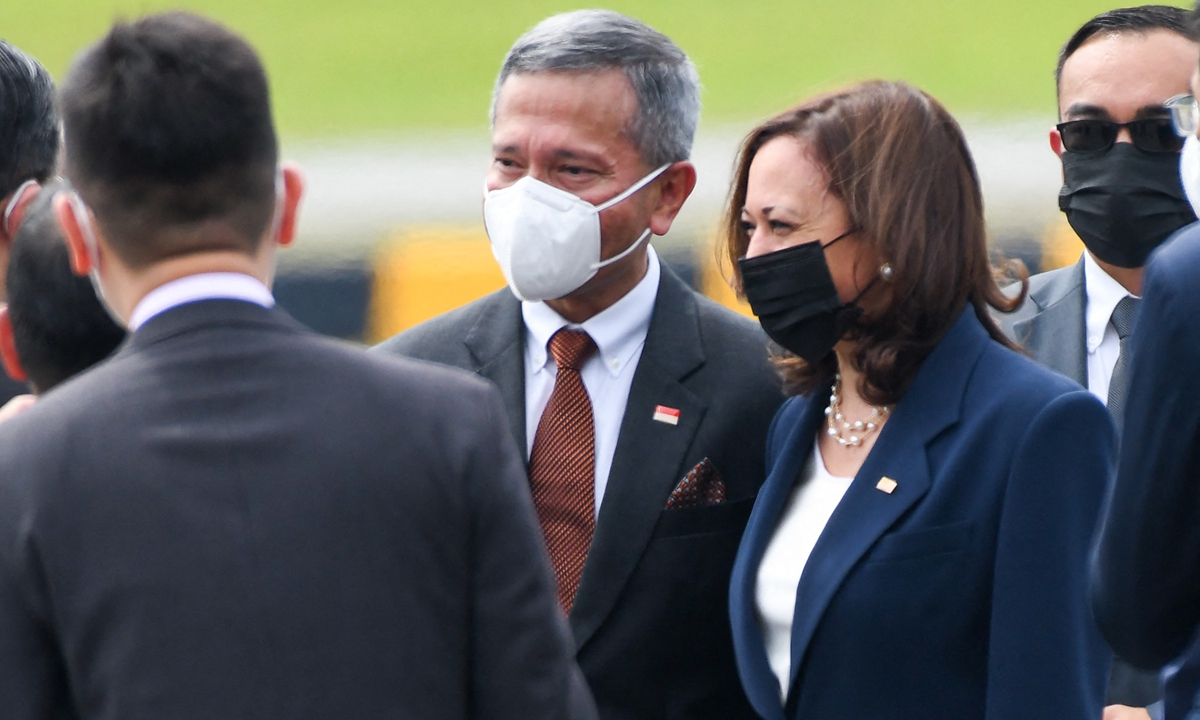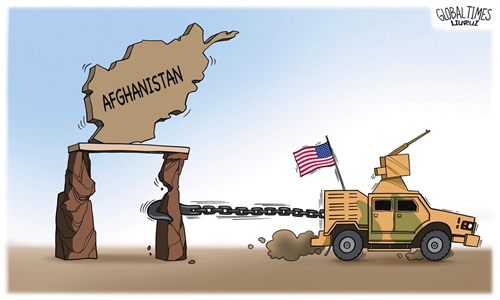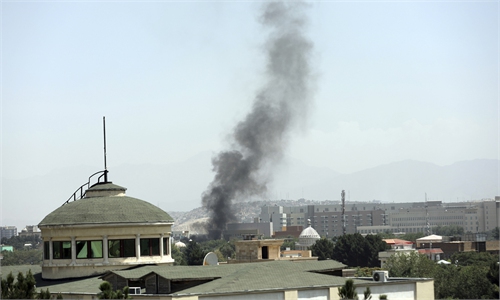
US Vice President Kamala Harris is greeted by Singapore Foreign Minister Vivian Balakrishnan (center) upon her arrival at Paya Lebar Base airport in Singapore on Sunday. Photo: AFP
As a quasi-ally of the US, Singapore's stance toward the US and China is telling. Singapore's Channel News Asia released on Sunday an interview with Vivian Balakrishnan, the country's foreign minister who said Singapore will "be useful but we will not be made use of" in its relations with both China and the US. He also said Singapore will not become "one or the other's stalking horse to advance negative agendas."
Singapore is one of the countries within ASEAN that highly depend on the US for security. During the Obama era, it played quite an active role in coordinating the US' South China Sea agenda by endorsing the South China Sea arbitration pushed forward by then Philippine president Benigno Aquino III in 2016. But in recent years, Singapore has tried hard to maintain a delicate balance between China and the US.
Small countries like Singapore have their own role in the region and on the world stage. They don't want to be used as a "stalking horse" by certain powers but they want to be useful in regional and international affairs. China has attached great importance to ASEAN's role in boosting regional integration, and that's where Singapore can find itself "useful." It also wants to play a mediating role in China-US relations, as Singapore Prime Minister Lee Hsien Loong recently called on the two countries to de-escalate tensions. That probably constitutes what Balakrishnan meant by "being useful."
It is worth noting that Balakrishnan's view was made public during US Vice President Kamala Harris' trip to the country, which will be followed by another one to Vietnam. Ge Hongliang, vice dean of the College of ASEAN Studies at Guangxi University for Nationalities, told the Global Times on Monday that the first target of Balakrishnan's words is the US, as it is the US that views its allies and partners as something that can be "used" for its agenda.
"Singapore is clear that the US hopes Southeast Asian countries could be confined by the US' Indo-Pacific Strategy whose ultimate aim is to contain China's rise. This is what Balakrishnan's 'be made use of' meant. So he said Singapore will draw a line between 'being useful' and 'being made use of.' Even when a senior US official comes, Singapore will not change its stance," Ge noted.
Ge said another targeted audience is other Southeast Asian countries.
"Singapore's stance toward China and the US serves as a model for those countries. Singapore has a big influence in the region. Most regional countries believe they should adapt to the changes of balance of power between China and the US and enhance their unity and tenacity as a whole," said Ge.
The US has ratcheted up efforts to win over Southeast Asian countries, manifested by Harris' visit to Singapore and Vietnam and other senior US officials' tours to the region in the past two months. Yet it will only enable Southeast Asian countries to see that the US is taking advantage of the situation and only focusing on its own interests. Washington does not view them as real partners, but as tools it can exploit to serve its strategies. The US debacle in Afghanistan is the very example that when the US finds it not cost-effective, it will only abandon its allies or partners without hesitation.
During Monday's press conference, Harris reportedly sidestepped a Singaporean journalist's question on US commitment to allies in the wake of the Afghanistan crisis, and reiterated talking points about partnership in Southeast Asia. Nonetheless, her talking points sound feeble. And when Singapore Prime Minister Lee Hsien Loong said his country valued the US renewing its ties with the city-state and other allies, his attitude appeared lukewarm.
With the US' sincerity toward Southeast Asia being called into question and regional countries pursuing an independent and balanced course, they will not become the "stalking horse" as the US has expected, but will carefully calibrate their interests to avoid falling into the US geopolitical trap.



